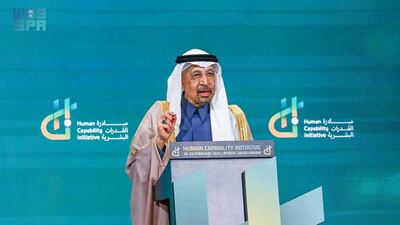Saudi Arabia’s minister of investment said that of the $3.3 trillion investment to transform its economy as part of its Vision 2030, developing the kingdom's human capability is the priority.
“Education is in itself the most important sector in which to invest,” Khalid Al Falih said on Thursday during his opening speech on the second and final day of the Human Capability Initiative event in Riyadh.
He said that the needs for the energy sector are changing as the world shifts to cleaner methods, along with the advanced technology markets, which both demand talent for jobs that have not yet been created. This will have “a tremendous impact” on Saudi Arabia’s global competitiveness, and that is where its investment will be directed, said the minister.
“Capital will go where the opportunities are greatest or where the future is brightest,” added Mr Al Falih, and to do that involves training Saudis for jobs of the future.
The kingdom has created 1.1 million new jobs since it announced its ambitious Vision 2030 economic transformation strategy in 2016. This includes more than 130,000 new jobs for Saudis in 2023, reported the country’s investment ministry, yet challenges exist in filling these jobs.
“The Saudi labour market is currently experiencing a wide skill gap,” according to a 2023 report from the Prince Mohammad Bin Fahd University, titled A Study to Identify the Potential Skill Gaps in the Saudi Labor Market Requirements.
“The traditional education system is not preparing the workforce according to the labour market requirements along with neglecting the strategic role of the human resource practices in the Saudi organisations,” the report stated.
Mr Al Falih stated that his country was invested in creating more opportunities for training during his HCI address to more than 5,000 attendees from local, regional, and global institutions from the private and public sector.
He highlighted Riyadh’s King Abdullah Petroleum Studies and Research Centre's launch of the kingdom’s first school of public policy, which was announced by the energy minister yesterday at the event. There is also the higher learning centre, the King Abdullah University of Science and Technology (KAUST), which he said is home to the Middle East’s most powerful supercomputer – Shaheen III.

Part of creating opportunities is including more of Saudi Arabia’s 32 million population, with 63 per cent of Saudis under the age of 30, according to the country's general authority for statistics. The formerly all-male King Fahd University of Petroleum and Minerals in Dhahran, is now educating a record number of women in higher learning.
“[Now] we have the highest intake of female engineering anywhere in the world,” said Muhammad Al-Saggaf, president of KFUPM, during a panel on the first day of the event, who believes an overall new approach to education is needed.
“You are not learning here to get a job, you are here to create a job,” said Mr Al-Saggaf.
Education needs to be available across society, he added, and it is being redefined to meet the future needs of the job market.
Anas Al-Mudaifer, the chief executive of the Human Capability Development Programme, founded in 2021 to set Saudis up for success at every stage of life, said a vital way of reaching Saudi Arabia’s whole population, which is spread over a vast 2.15 million square kilometres of land, is with increased connectivity.
“We're ensuring that education institutions are much closer to the demand” in order to properly prepare graduates for their industries, he told The National.
“Just before the vision [Vision 2030], if you had asked, where is the country’s mining school, it's only in Jeddah – where there are no mines. So we're trying to push and incentivise universities to be closer to their local economies and to talk to the demand of businesses around them, the entities that are going to hire their graduates,” he said.

Mr Al-Mudaifer said there is a push to give educational institutions the autonomy to make these changes to adapt to the needs of students and businesses alike. Identifying this need for each region is being centralised at the national level with institutions such as the National Labour Market Observatory, he said.
“Having access to this data will enable universities to adjust and adapt to the predictions of the labour market for each region, and the nation as a whole,” he explained.
Such is the case with Red Sea Global, which plans to invest $20 billion into developing its giga-city project about 500km north of Jeddah by the end of 2024. This includes the creation of 70,000 direct and indirect jobs by 2030.
Red Sea Global chief executive, John Pagano, said that, more than technical talent, he is looking for high-level human skills, which are key in the tourism and service industry.
“This is a human business. We need to deliver the services that our guests are going to remember, it’s about experiences, not about how smart our apps are,” he told The National.
“AI in our space is a back-office function. We use technology to do the things that are tedious and mundane and focus on the soft skills”.
Understanding what a high-level soft skill is is important to creating a population that has them, said Amit Sevak, chief executive of US-based private educational assessment organisation, Educational Testing Service.
“Increasingly, jobs are much more communication orientated for collaborating and creativity,” he said.
This can involve communicating automated systems to people, or between different levels of management such as a chief executive in high-level management to front line workers, to incorporate a strategy. Although communication soft skills are not one size fits all, he added.
“Skills needed for communication are job-specific,” said Mr Sevak, whose company conducts 50 million tests annually across 200 countries to understand educational needs.


